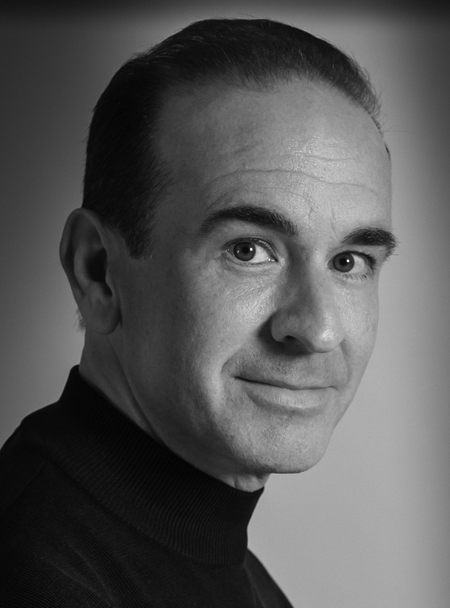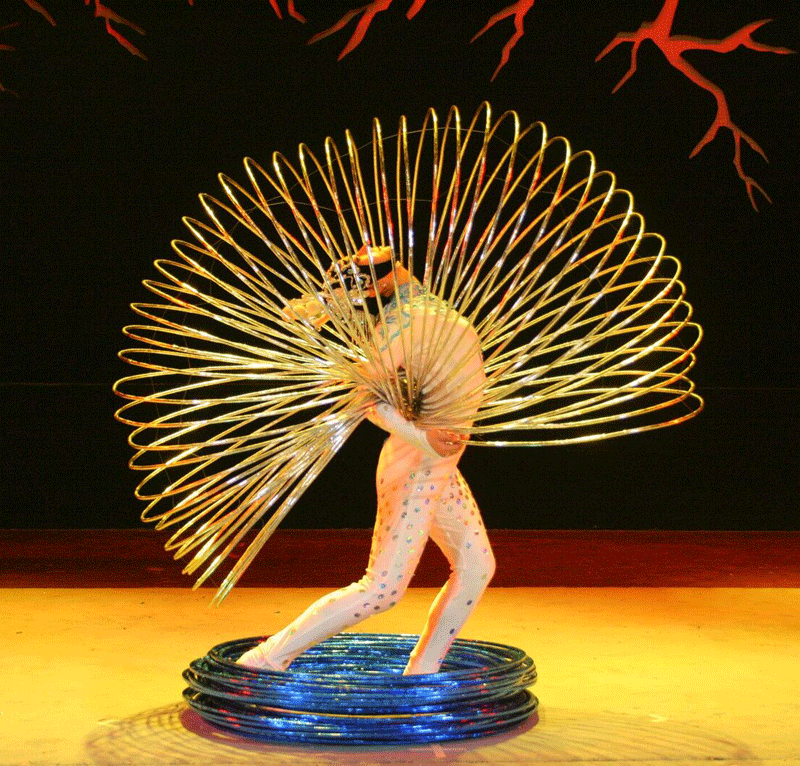Michael Nelaborige was born and raised in Fort Wayne’s north side in what was then considered “way out in the country” (north of Dupont and Coldwater).
“I was an only child and a very, very late surprise into my parents’ 15-year marriage,” he says.
He was a creative boy, but without siblings to engage in play-acting, he took on all the roles himself.
“I’d pretend to be the teacher at this little school desk my mom had gotten me,” he says, “and then I’d be the student doing an assignment. Then I’d grade it as the ‘teacher.’
“That may sound weird, but we didn’t have internet; we just had imaginations.”
Throughout his upbringing, he was surrounded by musical influences.
He grew up listening to his parents’ musical cast albums, imagining his own versions of the scenes in his mind. He also quickly became hooked on movie musicals which formed the basis for his lifelong passion in musical theater, particularly dancing.
“I started copying Gene Kelly’s and Fred Astaire’s moves by the time I was a pre-teen,” he says.
Although they weren’t stage performers, Nelaborige says his parents “were really, really terrific social dancers. They would dress up and go out every Saturday night. They had quite a reputation among their set of friends.”
His father was also an expert amateur roller skater and ice skater who drew crowds. His mother sang informally around the house and played the accordion and piano. He credits the family’s player piano as teaching him about rhythm and syncopation.
When he was five or six years old, he attended his first live performance – at the open-air Foellinger Outdoor Theatre which has since burned down.
“They used to put on these fantastic all-out classic summer musicals there,” he says. “The first show I saw was Mame, starring local TV celebrity Ann Colone. I loved everything about it.”
At the age of 13 he saw the 1976 Civic Theatre production of Brigadoon.
“This was in the golden days of the old-fashioned, MGM-esque productions with Robert Sandmaier’s sets and with Dick Casey directing days,” he says. “I can still see that production in my mind’s eye. I so wanted to be up there – and had no idea that many in the cast (some who are now longtime friends) were around my age at the time.”
The first production he appeared in, however, was decidedly less auspicious. In the same year he saw Brigadoon he was cast in his sixth grade production of Missisippi Melody (“a pathetic iteration of Tom Sawyer”) as the comedic secondary role. With eclectic costuming provided by the cast’s mothers and a surprisingly beautiful student-painted tempera-on-poster-board backdrop, the production ran two performances at the brand new Perry Hill Elementary.
He went on to attend Carroll High School, then a tiny 500-student school surrounded by corn fields. The theater featured a tiny stage with “a suspended ceiling that made every show you did look like it had a UFO hovering over it.”
By his freshman year, “the theater bug had deeply bitten,” and he performed in every possible production he could. At the time, Carroll only did one musical each year and no straight plays, but Nelaborige was cast in all of them.
His climb to community student stardom was somewhat rocky. His first high school musical, South Pacific, was canceled due to the Blizzard of ’78. His second show, The Apple Tree, had him in one unmemorable role wearing gold lam? harem pants in one act and having no lines in the second. He was crushed to be cast as another mute, King Sextimus in Once upon a Mattress during his junior year, but he later learned that he had been given so many pantomime roles due to his director’s faith in his physical comedy ability.
He discovered his true passion – as a song-and-dance man – during his senior year when he was cast in the secondary lead in The Pajama Game.
Meanwhile he performed in Carroll’s show choir under the direction of Carla Doles, with Cindy Shipley as choreographer. Nelaborige was dance captain and president. He credits them and theater director James Bauserman as inspiring his professional career in theater.
When it was time for college, his parents were getting pressure from all around to allow their son to study musical theater. His parents couldn’t disagree, but also believed he needed to get a “real job.”
“The message was clear,” he says, “so my telecommunications degree from Ball State was the ‘front’ for my real passion.”
Between Ball State and the Muncie Civic Theatre, he performed in as many as eight shows per year during college. He also toured with the Ball State University Singers and performed a season at the Red Barn Theatre in Frankfort, his professional theater debut.
“I wore dance shoes more than regular shoes back then,” he says. “It was a great time of learning and experimenting.”
He graduated with honors with a bachelor’s degree in telecommunications and a double minor in dance and musical theater. And then came the big post-graduate question: to pursue theater or not to pursue theater.
After a heart-to-heart conversation with Gladys Hearne, costumer at the Muncie Civic Theatre and former burlesque dancer known as “Mademoiselle Gigi,” he made his decision.
“I graduated in 1986,” he says, “packed up my Ruby Keeler tap shoes and anything else that fit into my 1964 Oldsmobile F-85, and headed to Florida to make it big in the Equity dinner theater scene.”
Unsurprisingly, Nelaborige found immediate success and began earning points toward his Actor’s Equity Association union card by performing in a succession of professional shows in Florida, New York and California. He was so sought-after, in fact, that he didn’t even have to wait tables between gigs.
“I was never the lead, but I learned that was okay,” he says. “I really liked being a ‘gypsy’ in the chorus with the occasional cameo role. I really loved being able to make a living solely doing what I wanted to do.”
For several years, he worked five days a week in Tampa as a Busch Gardens performer during the day and drove 50 miles to Sarasota to perform in Equity shows at night.
He even appeared in an Off-Broadway production, La Cage aux Folles, in 1988. He took the opportunity while in New York to audition for Broadway productions. It was then that he received his Actors Equity card, which he picked up at the main office in New York City.
“I’ll never forget that moment,” he says. “Nor will I forget the realization I had at that time that I couldn’t get cast [in New York] because, frankly, I was just too short for Broadway. I was getting eliminated before I ever got to sing or dance. It was a real wake-up call and a hard-but-good lesson about the theater world. But I ended up being okay with it.”
He spent the next five years with Royal Caribbean Cruises performing in million-dollar musical revues and earning a nice living. “I worked professionally for almost 15 years on just theater-related jobs,” he says. “I’m still pretty proud of that.”
Then in 1994, he made the difficult decision to move back to Fort Wayne to care for his aging parents.
“It was hard, but I don’t regret it for a moment,” he says.
Because Fort Wayne didn’t have a professional theater with an affiliation to the Actor’s Equity Association at the time, he withdrew from the union, which gave him the freedom to perform in amateur productions.
But before he could think about that, he says, “I had to totally reinvent myself. I had only performed since I’d left college.” And now he was back in a city with no professional opportunities available to him.
With his telecommunications degree and ability to write, he took a job at Vera Bradley as the company’s sole in-house copywriter. After nine years there, he started working at the locally-owned agency Britton Marketing & Design Group where he wrote copy for such national and international accounts as Benjamin Moore, Mariposa, Ace Hardware, Melrose International and even Vera Bradley.
“That line of work meshed with my creative side,” he says, “because I’m good with words and have an empathetic mindset, which comes from my acting background, and I have an excellent talent for meter and rhyme, which comes from my music background.”
He has recently become strictly a freelance writer, giving him the independence to focus more closely on theater again.
Although he is more drawn to musicals, in 2008 he did perform in his first non-musical since college: the Fort Wayne Civic Theatre production of Private Lives. But like many of the classic musicals he gravitates toward, that show had a classic, “frozen-in-time” quality he loves. “I’ve always felt I was born in the wrong era,” he says. “I’m uber-obsessed with period and making sure modern mannerisms or even modern body language never creep in.”
Nelaborige is currently playing the Bing Crosby role (Bob Wallace) in the Civic Theatre production of Irving Berlin’s White Christmas. The stage adaptation is quite different from the 1954 film, he says, so the challenge has been to find the character from a fresh perspective rather than merely imitating what on the screen. “It’s tricky because these characters live in a time that’s past, and we need to make sure they’re true to that time without stereotyping them,” he says.
Adding to the challenge is the knowledge that “the audience comes in with a lot of preconceived notions and expectations because they know and love the movie version so dearly.”
But because the characters are written differently for the stage version than they were Crosby, Danny Kaye, Vera-Ellen and Rosemary Clooney, he doesn’t see that as a pitfall.
“The characters are in many ways deeper than the original movie roles ever were,” he explains. “The film roles were just star vehicles, tailored to very specific screen talents.”
He says the cast is enjoying “bringing the characters to life in a more complete, personal way – once you can convince the audience to look at it differently than what they remember seeing in Cinemascope or VistaVision.”
But he promises that the show’s “signature” pieces are in place: “The guys hamming it up and breaking out in song and tap, the girls doing their famous feather fan dance to ‘Sisters.'” The show has also added music, with nearly 25 Irving Berlin songs in all.
Although Nelaborige tends to find himself in the bigger, splashier musicals Fort Wayne has to offer, he says he’s actually been relatively quiet, theater-wise, since returning to his hometown.
“After seven years, I dipped my toe back into it this year with some intimate cabarets at the wonderful, new Three Rivers Music Theatre,” he says. “They were a real blast, and I thoroughly enjoyed them.”
But his “true loves are the big shows,” he admits. “I’m not against growth and stretching my wings, but I feel I owe it to myself, and to the audience as well, to give the best performance I possibly can. And I know when my talents fit a role and when it doesn’t.
“I mean, I could play probably play Captain von Trapp in The Sound of Music. But should I? Nope.”





